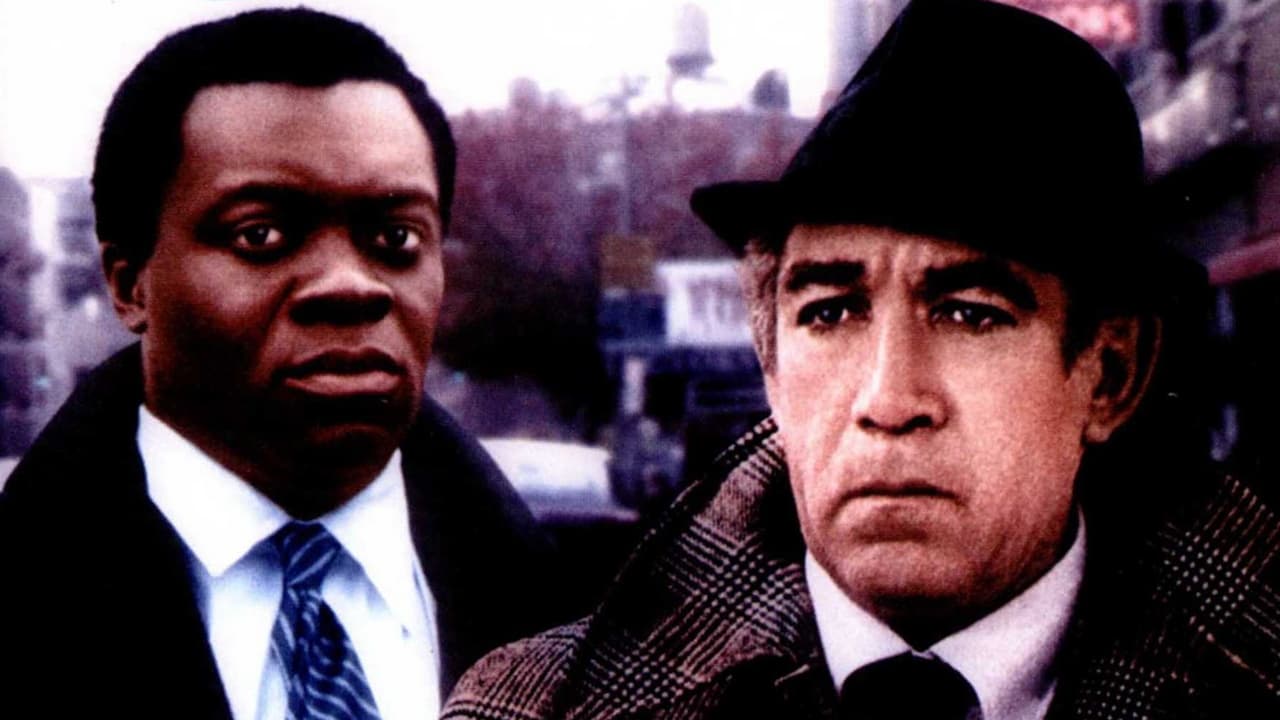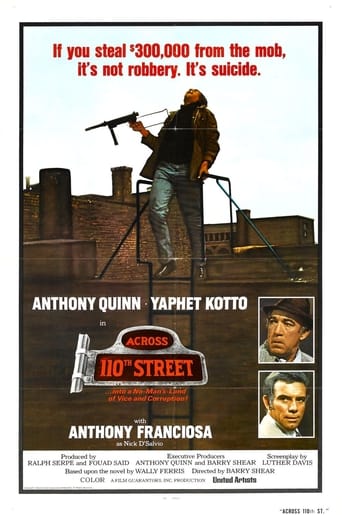SoftInloveRox
Horrible, fascist and poorly acted
Breakinger
A Brilliant Conflict
SteinMo
What a freaking movie. So many twists and turns. Absolutely intense from start to finish.
Zandra
The movie turns out to be a little better than the average. Starting from a romantic formula often seen in the cinema, it ends in the most predictable (and somewhat bland) way.
alexanderdavies-99382
"Across 110th Street" is one of the best films of its kind. Its gritty realism via being dark, grim and brimming with tension, elevates the film to that of a classic. It is unlikely that "Across 110th Street" shall ever be seen in its full version in Britain, as the British Film Censors demanded that three minutes of excessive violence be removed before the film was granted a certificate and put out on release. Regardless, this film has the ability to shock as well as to enlighten (entertain perhaps isn't the right word). From the violent opening scene to the shattering climax, the pace hardly lets up. Anthony Quinn - a medium star back in his day - takes the lead as the dedicated but corrupt and racist cop. Yaphet Kotto is effective as the more liberal cop whose pairing with Quinn makes for decidedly uneasy working relations. There is nothing remotely pretentious about "Across 110th Street" because the film's content represents every day life in New York for some. There are two plots that become linked with each other but the story of the Mafia family who have $300,000 stolen from them, takes priority. The tension intensifies with each step that the Mafia takes in finding the small-time thieves responsible. The film quickly faded from view with regards to British video releases. Then 14 years ago, it suddenly appeared on DVD. A masterpiece of American cinema of the 1970s.
Theo Robertson
I caught this on BBC 1 one night many years ago . I forgot the title but could vividly remember a number of scenes especially a line of dialogue where two characters describe a third one having his genitals mutilated . This type of movie would be broadcast on television 30 years ago and no one would blink an eyelid but at the same time you can understand why it wouldn't be shown on network TV today . It as also a sign of the times back then that the TV broadcast had the F word overdubbed to something less offensive but the racial slurs against both black and whites remained intact . Perhaps the fact this film is consciously insensitive and hard hitting works against it ? This is a pity because it's not some " Blaxploitation " fare but more of a New Hollywood thriller at its best The story itself is no great shakes - a couple of black dudes rip off and kill a few members of the Mafia and the black underworld and also kill a couple of uniformed cops in the process and find if not the entire world against them then at least the law enforcers and law breakers of NYC wanting to cap their ass . It's the sort of film Tarantino has been inspired by but unlike Tarantino's work this movie is devoid of post modernism and crippling self indulgence and is a relatively tightly plotted screenplay where lots of nasty things happen to lots of nasty people . There's a subplot featuring character interaction between Anthony Quinn's nasty racist white cop and Yaphet Kotto's not very nasty by the books black cop that might have been clichéd but does seem fresh and realistic , probably down to the fact the performances and writing portraying a rather amoral relationship between the two men and the wider world . And this does feel like an exceptionally amoral film that we never see nowadays more is the pity
MBunge
When you hear people lamenting the lost cinema of the 1970s, Across 110th Street is the sort of film they wish was still being made. There's a breed of raw and bold storytelling at work here that's been worn down by the burden of ridiculous budgets and the pull of the lowest common denominator in modern Hollywood. This tale of cops, robbers and the Mob pulses with a sizzling racial undertone and hammers at you with the blunt realities of working poverty. This kind of film-making wants the audience to think AND feel while most other films try and fail at only one or the other.The movie begins across 110th street, the border separating Harlem from the rest of New York. A couple of white Mafiosos have come to count up and collect the Mob's cut of the money from the black-run rackets that still have to operate under La Cosa Nostra's thumb. When two black police officers show up outside the apartment where the money is being counted, the first thought is to pay them off. Then one of the "cops" pulls out a machine and everyone knows it's a robbery. Things go wrong and the two mobsters, three black gangsters and two cops end up dead, while the two robbers and their getaway driver barely managed to escape with $300,000 of Mafia money.Both sides of the law then set out to track down the robbers. Nick D'Salvio (Anthony Franciosa), the son-in-law of the Don, is tasked with getting the money back and killing the men who took it. Nick's an insecure, desperate little man who's been his father-in-law's errand boy and grabs onto this job as his last chance to be a real made man. Police Captain Frank Mattelli (Anthony Quinn) has been the face justice for good and bad in Harlem for years, ruling over it more like a medieval county sheriff than a 20th century cop. But on this case, Mattelli has to play second fiddle to the black lieutenant that the powers-that-be put in charge of the investigation. Lieutenant William Pope (Yaphet Kotto) is as uncompromising and unyielding as Mattelli. He won't abide the older policeman's brutality and paternalistic, patronizing racism but does come to respect Matteli's ability and commitment as a cop.The chase between the good guys and the really bad guys to find the three robbers starts with the getaway driver. Henry J. Jackson (Antonio Fargas) is the sort of pimped out fool who struts around in rainbow-hued threads that look like they cost more than six months rent on his toilet bowl of an apartment. From there the search leads to Joe Logart (Ed Bernard), a guy who works in a laundromat and slowly comes to realize just how far down the road to Hell he's traveled. Finally, police and Mafia converge on Jim Harris (Paul Benjamin), a 42 year old epileptic who can't get a job better than superintendent of a slum lord's tenement. Jim is a hard man staring down the downslope of his life, deciding that rich or dead are the only choices for him.Across 110th Street is a starkly violent film. It might not seem that graphic in the age of Hostel and Saw, but there's a rough and chaotic edge to its moments of force and pain. The scenes of brutality in this movie are meant to shock, not startle or titillate. When bullets or punches fly and blood is shed, there's no sign of any practiced choreography. And the violence also follows two dramatic themes. First, there's the thuggish acts of Mattelli contrasted with the strong but civilized order that Pope insists be followed. Then there's the vicious but directed cruelty of the gangsters of both colors contrasted with the anarchic power of Jim Harris and his machine gun. In both cases an established code of savagery is confronted by a harbinger of the future.Another other fascinating aspect of this film is how it presents the changing racial order of 1970s America through both the police and the Mob. Mattelli is a 55 year old cop being pushed aside for the young black lieutenant and his rage against it is replaced by resignation. The Mafia is paranoid about maintaining its control over the black syndicates of Harlem while the black gangsters seethe at the white mobsters they have to tolerate but don't need. And the script smartly flips the black vs. white dynamic with Mattelli being the more effective cop than Pope, but the black gangsters proving themselves smarter and more capable than their Mafia superiors.Race isn't the only aspect of life at work in this film. The grinding existence of the working poor is also splashed all throughout the story. The squalor the three robbers live in tell you all you need to know about why they do they things the do.There's some nice, naturalistic acting on display here, particularly from Anthony Quinn and Paul Benjamin. Again, they play characters that mirror each other. Mattelli and Jim Harris are both strong, tough men who see nothing but decline in front of them. Mattelli, though, is too morally compromised to do anything about it while Harris still has the strength of will to try and be the master of his own fate. Yaphet Kotto gives an energetic performance, but he's playing more of a symbol than a human being.Across 110th Street is a powerful and somewhat sprawling work of entertainment. You should definitely give it a look.
Nazi_Fighter_David
Disguised as cops, three black crooks steal a big amount of cash after killing five syndicate runners and two policemen… The New York police and the Mafia react with immediate concern… Tough police veteran Captain Frank Mattelli (Quinn) resents the intrusion of Lieutenant Pope (Kotto), a black detective, in the case, while Mafia boss Don Gennaro (Frank Mascetta) sends his paranoid son-in-law, Nick D'Salvio (Anthony Franciosa), to reassert control over the Harlem branch and see that the money is recovered… The black syndicate, headed by Doc Johnson (Richard Ward) and his assistant Shevvy (Gilbert Lewis), rejects D'Salvio, while promising only token help, and accuses Mattelli, who has been on the take from Johnson for years… Anthony Quinn plays well the ageing detective who has long ago perceived that all his efforts are not going to do more than raise the very small part of the cover of crime, but he is not above taking a bribe from a racketeer… His method of dealing with a reluctant witness is to hit hard first and ask questions later…The rigorously legal approach to police work, as exemplified by Yaphet Kotto, is not for Quinn… This is his territory, his little kingdom, and he keeps the peace as best he knows

